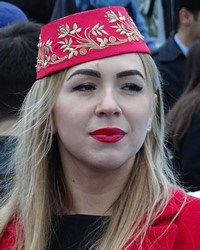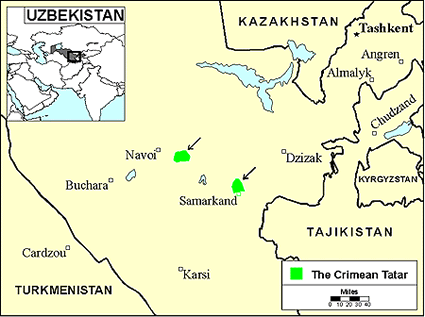The Crimean Tatars are descendants of the Mongols who swept through eastern Europe in the thirteenth century. They are part of a much greater Tatar population but speak a different language and live in different areas. Large numbers of Crimean Tatars can be found in Turkey, Romania, Uzbekistan, and the Ukraine.
Crimean Tatar history has been both complex and turbulent. For many years they endured hardship, oppression, and injustice. By the end of the 1440s, the Crimean Khanate was established on the Crimean Peninsula. However, Russian rule over them came late in the eighteenth century. When the Russian Empire gave way to the communists between 1917-20, Crimea was the last strongholds of the anti-Bolshevik (communist) forces. Soviet collectivization was especially harsh for the Crimean Tatars, and tens of thousands died because of it. In 1944, Stalin accused the entire Crimean Tatar population of collaborating with the Nazis and had them deported to Kyrgyzstan, Uzbekistan, Turkmenistan, and Kazakhstan. Sadly, almost half of them died in the ordeal. There are still thousands of them living in Uzbekistan today.
Since the Tatars' massive deportation in 1944, much of their traditional Crimean lifestyle has been lost. They have undergone an intense process of assimilation into other cultures. The older people have maintained a strong sense of ethnic identity. However, it has been extremely difficult for them to pass that identity on to their children.
Family ties are very important to the Crimean Tatars. The size of the immediate family ranges from four to five members. However, two or three generations will often live in the same house. The great majority of the Crimean Tatars marry within their culture, unlike some of their Tatar cousins. The family is strongly patriarchal (dominated by the men). The line of descent is through the father and inheritance is passed down through the males. Work is divided along traditional lines with men working outside and women tending to the children and the household duties.
A majority of the Crimean Tatars who live in cities wear Western style clothing. Elderly and rural people wear more traditional dress such as scarves, robes, and sandals.
The Tatars have a deep love for songs and music, which are popular at holidays and feasts. They perform popular folk songs, called manes and chin, whenever there is a celebration. If someone wanted to reach them for Christ, writing worship music in their preferred musical style would be an excellent option.
Crimean Tatars have been Sunni Muslims for centuries. Their negative experience with Orthodox Christians makes it very difficult for them to consider the claims of Christ. Meanwhile, they are getting along very well in Uzbekistan with the Sunni Muslim majority.
The Crimean Tatars need justice and mercy in their lives. They also need to find their way to Jesus Christ who can give them an identity in him that will help them have abundant life.
Pray for the Crimean Tatars to receive justice and mercy so that their needs will be met.
Pray for the Lord to reveal himself to Crimean Tatars who are willing to seek and find the only Savior.
Pray for Holy Spirit-driven workers to go to the Crimean Tatars in Uzbekistan.
Pray for a movement to Christ among the Crimean Tatars.
Scripture Prayers for the Tatar, Crimean in Uzbekistan.
| Profile Source: Joshua Project |












